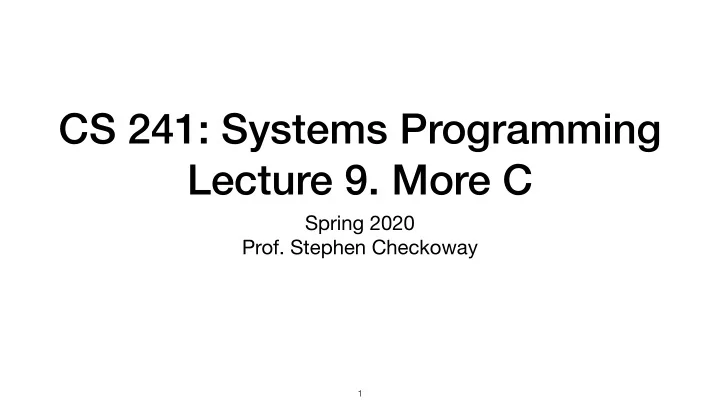

CS 241: Systems Programming Lecture 9. More C Spring 2020 Prof. Stephen Checkoway 1
Operators The same as Java ‣ Arithmetic: + , - , * , /, % ‣ Logical: && , || , ! ‣ Bitwise: & , | , ^ , ~ , << , >> ‣ Pre/post increment, decrement: ++ , -- ‣ Relational: == , != , < , <= , > , >= ‣ Assignment: = , += , -= , *= , /= , %= , &= , |= , ^= , <<= , >>= There are some others we'll talk about later ‣ sizeof ‣ . ‣ -> 2
C has pre- and post-increment (++) and -decrement (--) operators. What does this code print? (%d means print an integer) int main(void) { int x = 3; int y = 5; printf("%d %d\n", x--, ++y); return 0; } A. 2 5 D. 3 6 B. 2 6 E. Undefined C. 3 5 3
C has pre- and post-increment (++) and -decrement (--) operators. What does this code print? (%d means print an integer) int main(void) { int x = 3; printf("%d\n", x-- + --x); return 0; } A. 3 D. 6 B. 4 E. Undefined C. 5 4
Huge difference from Java C is full of undefined behavior, implementation-defined behavior, and unspecified behavior Undefined behavior gives the compiler license to do whatever it wants, including nothing Implementation-defined behavior means the compiler gets to choose (and document) its behavior Unspecified behavior means the compiler gets to pick from among several choices 5
What does the code print? #include <stdio.h> int foo( void ) { A. foo D. Undefined printf("foo \n "); behavior, bar return 1; could print 1 2 anything } B. bar E. Unspecified int bar( void ) { foo behavior, printf("bar \n "); 1 2 either A or B. return 2; } C. 1 2 foo int main( void ) { bar printf(" %d %d\n ", foo(), bar()); return 0; } 6
Control flow if statements; for , while , do - while loops almost identical to Java zero is false, nonzero is true 7
Examples int signum( int x) { int sum_of_squares( int n) { if (x < 0) int result = 0; return -1; for ( int i = 1; i < n; ++i) if (x > 0) result += i * i; return 1; return result; return 0; } } 8
Examples bool get_reponse( void ) { int response; do { printf("Enter y or n \n "); response = getchar(); } while (response != EOF && response != 'y' && response != 'n'); return response == 'y'; } 9
Compiling code $ ⟨ compiler ⟩ ⟨ options ⟩ ⟨ .c files ⟩ ⟨ libraries ⟩ $ clang -Wall -o program -std=c11 *.c -lm If you omit -o output , the default is a.out If you omit -std=c11 , clang and gcc have di ff erent defaults! 10
Compiler options (gcc/clang) 11
Compiler options (gcc/clang) -E preprocessor only 11
Compiler options (gcc/clang) -E preprocessor only -S compile only (no assembly or linking) 11
Compiler options (gcc/clang) -E preprocessor only -S compile only (no assembly or linking) -c compile/assemble (produce .o file) 11
Compiler options (gcc/clang) -E preprocessor only -S compile only (no assembly or linking) -c compile/assemble (produce .o file) -o foo specify output file as foo 11
Compiler options (gcc/clang) -E preprocessor only -S compile only (no assembly or linking) -c compile/assemble (produce .o file) -o foo specify output file as foo -lxxx use library named libxxx.so or libxxx.a 11
Compiler options (gcc/clang) -E preprocessor only -S compile only (no assembly or linking) -c compile/assemble (produce .o file) -o foo specify output file as foo -lxxx use library named libxxx.so or libxxx.a -g emit debugging symbols (enables debugging) 11
Compiler options (gcc/clang) -E preprocessor only -S compile only (no assembly or linking) -c compile/assemble (produce .o file) -o foo specify output file as foo -lxxx use library named libxxx.so or libxxx.a -g emit debugging symbols (enables debugging) -std=c11 use C11 standard 11
Compiler options (gcc/clang) -E preprocessor only -S compile only (no assembly or linking) -c compile/assemble (produce .o file) -o foo specify output file as foo -lxxx use library named libxxx.so or libxxx.a -g emit debugging symbols (enables debugging) -std=c11 use C11 standard -pedantic be pedantic -Wall turn on "all" warnings -Wextra turn on extra warnings -Werror make warnings into errors 11
Formatting your code It's more important to be consistent than anything else when it comes to format Use tools! # Writes formatted code to stdout $ clang-format foo.c # Writes formatted code back to foo.c $ clang-format -i foo.c 12
In-class exercise https://checkoway.net/teaching/cs241/2020-spring/exercises/Lecture-09.html Grab a laptop and a partner and try to get as much of that done as you can! 13
Recommend
More recommend